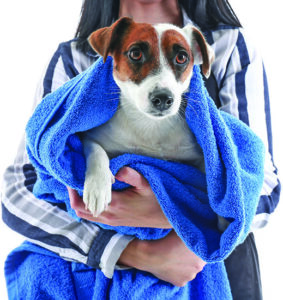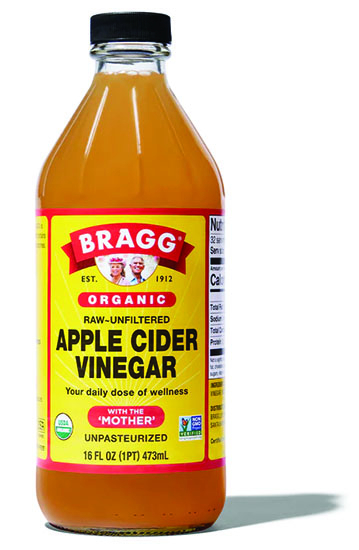According to its advocates, apple cider vinegar (ACV) is one of the least expensive, most versatile, and most effective canine health aids.
Applied topically it’s a popular treatment for:
- Itchy, flaking skin and dull coats
- Flea infestations
- Sore muscles
- Ear infections
- “Doggy” skin and coat odors
Taken internally, apple cider vinegar is said to:
- Improve digestion
- Help prevent urinary tract infections
- Fight yeast infections
- Relieve arthritis symptoms
- Extract medicinal properties from plants when used to make alcohol-free herbal tinctures
WHAT IS VINEGAR, ANYWAY?
All vinegars are made from liquid containing sugar, and cider vinegar begins as a blend of water and apples or apple pectin, a soluble fiber. When exposed to air, which allows yeasts to grow, the natural sugars in apples ferment and become alcohol. As fermentation continues, acetic acid bacteria turn the alcohol into acetic acid, which is vinegar’s main component. Acetic acid gives vinegar its distinctive taste, odor, and properties.
Because of vinegar’s culinary uses, most groceries carry a variety, such as balsamic (a thick, intensely flavored grape vinegar), white or red wine vinegar, and vinegars made from malt, rice, champagne, sherry, beer, and various fruits.
Distilled white vinegar is widely sold in the U.S. Made from grains, it has a sharp, distinct flavor and fragrance, and it’s popular as a household cleaning agent and an ingredient in salad dressings, pickles, catsup, and barbecue sauces.
In contrast, apple cider vinegar is often sold as a raw (unpasteurized) product containing the vinegar’s “mother,” a cloudy substance containing unfiltered acetic acid bacteria. Unpasteurized, unfiltered vinegar is preferred by those who consider vinegar a health supplement.
APPLE CIDER VINEGAR AND YOUR DOG
Reports about the health benefits of cider vinegar are anecdotal because no clinical trials testing cider vinegar’s effect on dogs have been published in the medical literature. This does not mean that claims about its uses have been disproven; they simply haven’t been tested, mostly because apple cider vinegar is inexpensive, widely available, and cannot be patented.
Some of the claims are exaggerations. For example, cider vinegar is often called a nutritional powerhouse, full of vitamins and minerals, but this is inaccurate. According to the U.S. Department of Agriculture, raw cider vinegar contains 11 milligrams (mg) potassium per tablespoon, but that is its only significant nutrient.
Apple cider vinegar won’t cure your dog’s cancer, and while it might help prevent urinary tract infections, it isn’t a cure for that condition.
Apple cider vinegar is usually administered to dogs:
- Diluted by adding apple cider vinegar to your dog’s water (such as 1 part apple cider vinegar diluted in 3 to 5 or more parts water or another liquid),
- One-to-one or 50-50 (equal parts of apple cider vinegar and water or liquid), or
- Full-strength (undiluted) carefully applied with a cotton ball, sponge, or dropper.
Apple cider vinegar can be used as a mild cleaner and disinfectant in the following ways:
- Dilute cider vinegar 50-50 with water and apply with a sprayer or sponge immediately after bathing to remove leftover soap residue, alleviate dandruff and itchy skin, condition hair, and repel fleas. To help prevent dander, rub diluted cider vinegar into the dog’s skin just before bathing and wash it off.
- A 50-50 cider vinegar soak or rinse can soothe itchy feet, and it can be massaged into muscles strained by overactivity.
- To make a simple ear cleaner that helps control yeast and fungus (do not apply to inflamed or broken skin), mix 2 tablespoons cider vinegar with 1 cup warm water.
- Diluted or full-strength cider vinegar can be sprayed as a deodorizer on dog toys and bedding. Added to laundry rinse water, it acts as a gentle disinfectant.
To help improve your dog’s coat, digestion, or overall condition:
- Add apple cider vinegar to your dog’s water bowl, starting with a small amount, such as 1 tablespoon cider vinegar in a large bowl of water. Leave a bowl of plain water nearby as a backup in case your dog doesn’t like the taste. Dogs who are used to cider vinegar easily adjust to other water sources when vinegar is added to water while traveling.
- Cider vinegar can help digestion by increasing stomach acid levels, which may improve nutrient absorption. Start by adding small amounts to food or water and gradually increase to approximately 1 teaspoon per 15 pounds of body weight (about 1 tablespoon per 50 pounds).
- Some users report that organic unpasteurized, unfiltered cider vinegar added to food and water has helped relieve their dogs’ arthritis symptoms.
- When adding cider vinegar to food or water, start with small amounts and, if your dog tolerates the taste, increase gradually. If the condition you hope to improve doesn’t change within 30 days, discontinue treatment.

- A washing solution of 1 part vinegar in 3 parts water has been shown to remove 98% of bacteria, out-performing antibacterial soap. Use the solution and a scrub brush on vegetables that will be included in a dog’s raw, home-prepared diet, and rinse in clean water.
- For a fragrant coat conditioner, loosely fill a glass jar half full with dried rose petals or lavender blossoms, cover with cider vinegar, and let stand for a month or more. Strain, then lightly spray onto wet hair after bathing.
USE APPLE CIDER VINEGAR IN TINCTURES
Most herbal tinctures are alcohol-based, but cider vinegar is a preferred solvent for tinctures for dogs. In her book Herbal Recipes for Vibrant Health (Storey Publishing, 2008), herbalist and dog-lover Rosemary Gladstar recommends placing chopped fresh or dried herbs in a glass jar (if using dried herbs, fill the jar only halfway to allow for expansion), then gently heat raw organic cider vinegar, cover the herbs with warm (not hot) vinegar, leave a 2- to 3-inch margin, close the lid, and let the herbs soak for four to six weeks. Shake the jar daily. Strain and store the tincture in dark cobalt or amber glass bottles, label, and keep away from heat and light.
In addition to herbs listed in her books and in canine herbal references, Gladstar recommends a garlic/dandelion vinegar tincture as a general tonic and to help dogs repel parasites. Use fresh or dried dandelion leaves, roots, and blossoms with an approximately equal amount of garlic and follow the instructions above.
Add tinctures to your dog’s food in small amounts, gradually increasing to 1/4 teaspoon per 20 pounds of body weight per day.
Learn more about Apple Cider Vinegar Tinctures.
CAUTIONS FOR APPLE CIDER VINEGAR FOR DOGS
Because of its acidity, cider vinegar should be diluted for most canine uses. Avoid the eyes, mucous membranes, and open cuts or abrasions as vinegar will sting if applied to broken skin.
Vinegar should not be used where it could stain or damage wood floors, cabinets, or granite countertops. Cider vinegar is orange-brown in color, so its topical application is not recommended for dogs with white or light coats or for use where it can stain white or light colored carpets or fabrics.
Before applying diluted cider vinegar to a skin-sensitive dog, test a small area of bare skin with the solution and check 24 hours later for any sign of irritation, itching, or scratching. If your dog doesn’t have an adverse reaction, use moderate amounts such as those described here. Feeding too much cider vinegar can led to vomiting, damage to dental enamel, and mouth irritation.







What can I use, feed, add to help STOP his cancer from growing in his body?
Please use Google and you will get some answers. You need to use due diligence in making a decision. There are mushrooms and other natural remedies to shrink/stop the growth of tumors. If you know the type of cancer they probably have different alternatives. Just like with people diet is very important when fighting cancer. Sorry that you’re dealing with this. I will pray for you and your pet.
Try feeding your dog with a balanced raw diet. Some kibble brands contain ingredients that harm our pets and cause an array of medical issues.
Also, eliminate all cleaning products you have under the kitchen cabinet that contain harsh chemicals and switch to natural ones. You can even make your own out with simple ingredients such as vinegar, baking soda, castile soap etc. Same applies to unsafe products to clean your floors. Pets have more sensitive smell and the chemicals in these cleaning products are bad for them. Just as they are not safe for humans.
Have been using a product from OMS that someone on this site recommended for itchy skin. Within a couple days my baby Lulu was able to rest comfortably. Actually we both were because if something is bothering her it’s bothering me. She started itching a little so I will try the apple cider vinegar as part of her bath. I really enjoy reading articles about natural remedies, both for people and our pets. God’s wisdom in providing these resources is priceless. For thousands of years they were/are working and since you can’t patent them very few studies are done. Big Pharma is the top dog today and their thirst is unquenchable. Sorry for the long post. 😊
Michael M. great comment
Thank you!🥰
Thank you!🥰
Please tell me which product from OMS helped your itchy dog. Thank you
I had read that Apple cider vinegar should only be given 2-3 times a week.
Is this an ad?
I have been using a 50-50 solution of vinegar (either white or apple cider) for years as an insect repellent. I use it both for my dogs and for us humans as well to repel insects, including fleas and ticks, while we are outside for our walks or in the backyard, and apply it by spraying it on the body or fur from a spray bottle. You can smooth it over the outside of the ears, the neck and over the dogs’s backs and tail. It doesn’t smell bad at all, the odor dissipates and the protection lasts for the duration of our walk or hike. It is inexpensive to make and contains no harsh chemical repellents.
I am a dog groomer and I have used vinegar and water (50/50) for my ear cleaning solution for the last 20 years. Works great.
Can I give my dog apple cider vinegar capsules instead of the liquid?
In response to Carol.. it’s well-established that around 70% of a dogs immune system resides in the gut. So one of the best things you can give your dog is a high quality probiotic. By supporting his gut health, you are supporting his immune system. You can find a really good probiotic at: CanineProtect.com – Obviously your post was a while ago, but it might help others on here.